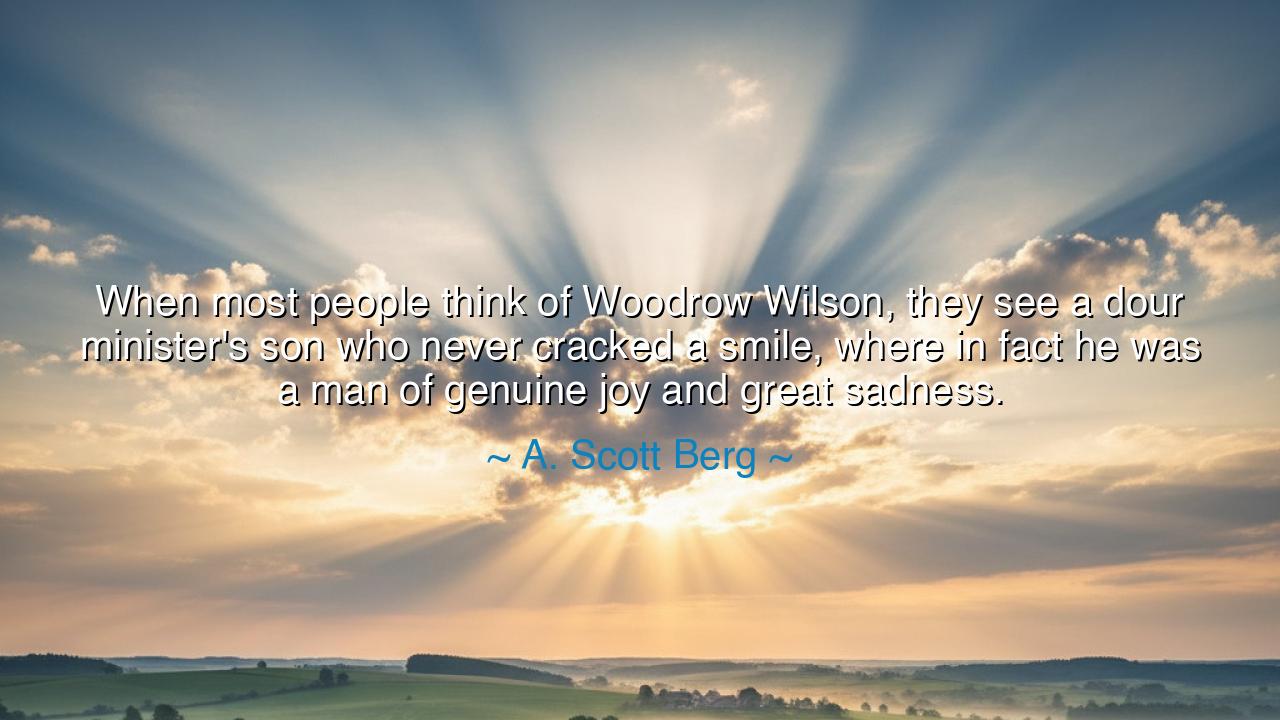
When most people think of Woodrow Wilson, they see a dour
When most people think of Woodrow Wilson, they see a dour minister's son who never cracked a smile, where in fact he was a man of genuine joy and great sadness.






Hear the words of A. Scott Berg, biographer and seeker of hidden truths, who declared: “When most people think of Woodrow Wilson, they see a dour minister's son who never cracked a smile, where in fact he was a man of genuine joy and great sadness.” In these words lies the reminder that human beings are never as simple as the mask they wear before the crowd. Woodrow Wilson, the 28th President of the United States, has often been remembered as stern, solemn, a figure of gravity. Yet Berg reveals the paradox at Wilson’s core: a soul that held both joy and sadness, laughter and burden, light and shadow.
The origin of this truth lies in the very nature of leadership. Wilson was the son of a Presbyterian minister, raised in an environment of piety, discipline, and duty. This upbringing gave him a face the world often misread—a face that seemed humorless, marked by severity. Yet within him lived a man who knew delight, who cherished companionship, who smiled, even as he carried the crushing responsibilities of war and peace. Like many great figures, his image became a statue in the minds of the people, but Berg’s words remind us that behind the stone exterior lived a fragile, beating heart.
History teaches us this lesson again and again: that the greatest souls often dwell in paradox. Consider Abraham Lincoln, who was remembered for his melancholy, the deep furrows in his face, and the sorrows that shadowed him. Yet those who knew him personally spoke of his endless jokes, his fondness for storytelling, his ability to laugh amidst tragedy. He, too, held genuine joy and great sadness, both alive within him. To be human is to hold these contradictions; to lead is to carry them before the world.
Wilson’s own life bore the weight of triumph and tragedy. He was a scholar, a dreamer, a man who envisioned a new world order after the First World War with his League of Nations. Yet even as he reached for lofty ideals, his body betrayed him; a devastating stroke left him broken, unable to fulfill his vision. Imagine, then, the paradox of such a man: to smile with hope as he dreamed of peace, and to weep inwardly as his health, his power, and his legacy slipped from his grasp. Here was no dour figure alone, but a man of both radiant joy and unbearable grief.
The meaning of Berg’s words is this: do not judge by appearances, nor by the shallow stories history tells. Every person you meet, even those carved into the cold marble of public memory, holds within them multitudes. A stern face may hide a laughing soul. A smile may mask a heart weighed down by sorrow. Wilson, like all of us, was not one thing, but many. To recognize this complexity is to honor the fullness of humanity.
The lesson for us is clear: resist the temptation to reduce others to one dimension. See not only the stern exterior of your neighbor, but imagine the joy they may carry. See not only the laughter of a friend, but recognize the hidden sadness that laughter may shield. In doing so, you cultivate compassion, understanding that no life is ever simple.
Practical action must follow. When you encounter others, look beyond the first impression. Do not dismiss the “dour” as joyless, nor assume the joyful are free from pain. Listen, observe, and give space for people to be both. In yourself, too, allow this paradox. Do not fear your sadness, for it makes your joy deeper. Do not fear your joy, for it gives your sadness meaning. Embrace the wholeness of your humanity.
Thus the teaching is sealed: a human being is both light and shadow, joy and sorrow intertwined. Woodrow Wilson, remembered wrongly as a man without smiles, was in truth a man of laughter and tears. Let this be a reminder that every soul you meet carries unseen depths. And let it be an encouragement that in your own life, your sorrow does not erase your joy, nor your joy your sorrow. Both are part of the great song of being, and both give your life its true power.






AAdministratorAdministrator
Welcome, honored guests. Please leave a comment, we will respond soon